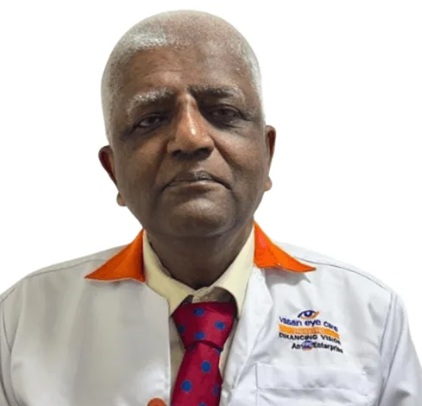How Long will My Vision be Blurry after Lasik?

Quick Summary
Blurry vision after lasik is a common side effect that usually goes away within a few days.
There are a few things you can do to help reduce blurry vision after lasik, such as:
- Avoid rubbing your eyes
- Use artificial tears
- Wear sunglasses to protect your eyes from the sun
If your blurry vision does not improve after a few days, you should see your doctor.
Are you thinking about getting a lasik surgery but also worried that for how long will my vision be blurry after lasik?
Lasik (Laser-Assisted In Situ Keratomileusis) is the best-known and most commonly performed eye surgery. It is used to correct vision problems such as nearsightedness (myopia), farsightedness (hyperopia), and astigmatism. The procedure involves using a laser to reshape the cornea, which is the clear front part of the eye that helps to focus light. LASIK is a relatively quick and painless procedure that is done on an outpatient basis. Recovery time is usually short, and most people experience improved vision within a day or two.
To know more about blurry vision after lasik and to get more answers to many of your questions, keep reading.
Length of Blurry Vision after lasik
If you are looking for “how long will my vision be blurry after lasik?” then you are at the right place.
The duration of post-operative blurry vision after lasik surgery can vary from person to person. It is a common side effect of the procedure and typically resolves within a few days to a couple of weeks. Since your eyes are adjusting to the newly reshaped cornea, they need time to get used to functioning in a new way.
Most people experience some degree of visual impairment immediately after the procedure, with most of the visual recovery happening within the first 24 hours. During the first day, patients may experience halos, glare, and starbursts around lights, but these symptoms usually decrease each day.
However, vision can be considered "good" within a day or two after LASIK, but it can take up to a month for the eyes to fully heal and for the best possible visual outcome to be achieved. Some people may experience some fluctuations in their vision for several weeks or even months after the surgery, especially during the first month.


Reasons behind Blurry Vision after lasik
You can have blurry vision, even 2 months after lasik surgery, which can be caused by a number of factors. One common cause is a difference in the refractive error between the two eyes. After lasik surgery one eye blurry while the other is clear can result from it. Other possible causes of blurry vision after lasik include:
- Dry eye: Dry eyes cause blurred vision after lasik temporarily because the eye's natural tear film is essential for maintaining clear vision.
- Undercorrection or overcorrection: If the lasik procedure does not correct your vision to the desired level, you might still have blurry vision. Similarly, if too much tissue was removed during the procedure, you may have overcorrection, which can also cause blurry vision.
- Scarring or inflammation: In rare cases, scarring or inflammation in the cornea can occur after lasik, leading to blurry vision.
- Flap complications: If the flap created during the lasik procedure is not properly aligned, it can cause blurry vision.
You may even experience blurry vision in one eye after lasik surgery, and it is important to contact your eye surgeon as soon as possible for further evaluation and management. Your eye surgeon will be able to examine your eyes, determine the cause of your blurry vision after lasik and recommend the appropriate course of action.
Do’s and don’t to avoid Blurry Vision after lasik
It is essential to take care of your eyes, especially after lasik surgery, to avoid side effects. Here are some do's and don'ts to help prevent blurry vision after lasik surgery:
Do's:
Follow your eye doctor's instructions for post-operative care, including using any prescribed eye drops and protecting your eyes from dirt, dust, and other irritants.
- Take breaks from screens and other activities that strain your eyes.
- Use artificial tears or other lubricating eye drops as directed to keep your eyes moist and comfortable.
- Practice good eye hygiene, including washing your hands before touching your eyes and avoiding rubbing your eyes.
- Wear protective eyewear when playing sports or engaging in activities that could harm your eyes.
Don'ts:
- Don't rub your eyes or apply pressure to them.
- Don't wear makeup or other products that could irritate your eyes for the first few weeks after surgery.
- Don't participate in activities that involve contact sports or other activities that could potentially harm your eyes.
- Don't use over-the-counter eye drops or other products without consulting your eye doctor.
- Don't expose your eyes to extreme temperatures, such as hot water or steam, for the first few weeks after surgery.
By following these dos and don'ts, you can help reduce the risk of blurry vision and other complications after lasik surgery. However, it's important to note that some blurriness and other visual disturbances are common after lasik and usually resolve on their own within a few days or weeks.
When to Consult a Doctor?
It is important to follow the postoperative instructions provided by your ophthalmologist closely after LASIK surgery. These instructions will typically include information on when to schedule follow-up appointments, as well as what to expect in terms of recovery and healing.
Follow-up appointments should be made with the ophthalmologist within the first 24-48 hours after the surgery to check for any immediate complications.
If you experience any of the following symptoms, you should contact your ophthalmologist immediately or seek medical attention as they may indicate a complication:
- Severe pain or discomfort in your eyes
- Blurred vision that does not improve within a day or two
- Light sensitivity or halos around lights
- Redness or swelling in your eyes
- Loss of vision
- Discharge or tearing from your eyes
Takeaway
It is common for people to experience blurry vision after lasik eye surgery. This is usually a temporary side effect as the eye heals from the procedure. In most cases, the vision will improve and should be fully restored within a few weeks to a few months.
However, it is important to follow the post-operative instructions provided by your surgeon and attend all follow-up appointments. If your vision does not improve or if you experience other problems, it is important to inform your surgeon as soon as possible.
If you are looking for a hassle-free surgical experience, HexaHealth is your ideal choice. HexaHealth is a patient-first platform that will help you throughout your surgical journey, from finding the right doctor and hospital to post-surgery recovery. So what are you waiting for? Get in touch with an HexaHealth expert TODAY!
Frequently Asked Questions
Why is my vision still blurry a week after lasik?
How long does it take to see clearly after lasik surgery?
Most people experience a significant improvement in their vision within the first few days after the procedure, and their vision continues to improve over the next several weeks as the eye heals.
Will my vision continue to improve after lasik?
Can you rub your eyes 3 weeks after lasik?
It is not recommended to rub your eyes for at least a month after LASIK surgery. Rubbing your eyes can irritate and increase the risk of infection.
Can dry eyes cause blurry vision after lasik?
When can I stop wearing goggles after lasik?
The timeline for when you can stop wearing goggles after lasik will vary depending on your specific case and the instructions given to you by your surgeon. It may range from a few days to a week or more. In general, you should expect to wear goggles for a while to protect your eyes from accidental rubbing or injury while they heal.
How often does lasik need to be touched up?
Should I sleep with sunglasses on after lasik?
Why is my vision getting worse after lasik?
How long does it take to have 20-20 vision after lasik?
Last Updated on: 18 February 2023
Reviewer

Dr. Aman Priya Khanna
MBBS, DNB General Surgery, FMAS, FIAGES, FALS Bariatric, MNAMS General Surgery
13 Years Experience
Dr Aman Priya Khanna is a highly experienced and National Board–Certified Laparoscopic, GI, and Bariatric Surgeon with over 13 years of clinical expertise.
He is widely regarded as one of the best bariatric surgeons in Ahmedabad, ...View More
Author

An enthusiastic writer with an eye for details and medical correctness. An avid reviewer and publisher. She emphasises authentic information and creates value for the readers. Earlier, she was involved in making ...View More
Expert Doctors (10)
NABH Accredited Hospitals (5)
Latest Health Articles
Related Treatments
























 Open In App
Open In App